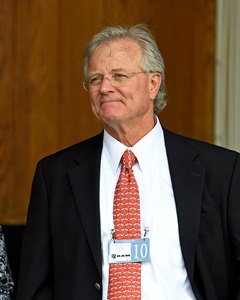Mott Vows to Fight New York Suspension and Fine


The attorney for Hall of Fame trainer Bill Mott said that he is prepared to press on with Mott’s lawsuit against the New York State Gaming Commission and the New York State Drug Testing Research Program following a Jan. 22 ruling by the NYSGC to uphold penalties of a 15-day suspension and $1,000 fine against Mott stemming from an alleged medication overage from 2014.
Attorney Drew Mollica said a conference is scheduled for Jan. 25 with a state supreme court judge that will include Mott; a representative of the state attorney general’s office representing the gaming commission; and a lawyer for Dr. George Maylin, director of the state’s drug testing and research program.
“We are fully prepared to take this as far as it has to go,” Mollica said. “Their lab screwed up and charged (Mott) with something he didn’t do. Bill is disheartened because this is a travesty. We know the road to justice is a long and hard one, and we’re prepared for it.”
The case against Mott stems from a Sept. 20, 2014, race at Belmont Park wherein the Mott-trained Saratoga Snacks ran sixth and last. New York’s contract lab at Morrisville State College found alleged overages of flunixin (Banamine) and furosemide (Salix) in Saratoga Snacks’ post-race blood sample. However, the lab failed to provide Mott with a sample of the horse’s blood with which to have a split, or referee, sample tested at an independent laboratory.
Moreover, New York labs have had a long history of not providing adequate blood with which independent labs could perform confirmational testing of questionable samples. In what many believe to be a direct result of Mott’s fight against New York regulators, the New York Thoroughbred Horsemen’s Association reached an agreement with the gaming commission in November that for the first time guaranteed horsemen would have adequate blood samples to send to an independent lab.
“The proof is in the pudding,” Mollica said. “They have incorporated a mandatory split test at New York Racing Association racetracks. You think that’s because our suit is frivolous or wrong? Bill Mott’s efforts have protected all horsemen going forward. He’s won the war. Now the gaming commission wants to punish him for doing that.”
At the Jan. 22 hearing, the commission threw out the Lasix overage charge against Mott, yet didn’t adjust the penalties assessed against him three years ago.
Dr. James Hunt testified three years ago that he treated Saratoga Snacks with a “normal and permissible 500mg injection of Banamine five hours outside the 24-hour withdrawal period established for the medication … it is inconceivable that Saratoga Snacks could test positive for Banamine at any impermissible level, much less at 10 times the permissible level reported by the state’s testing laboratory.”
Dr. Megan Austin, a vet working for NYRA at the time, told a state gaming commission investigator she administered a 3cc injection of Lasix to Saratoga Snacks on the morning of the race. That is the lowest permissible dose that can be administered, and Mott specifically had asked for the low dose. Up to 10cc is permitted.
